- Home
- Linda Newbery
Set In Stone
Set In Stone Read online
Also by Linda Newbery:
THE SHELL HOUSE
SISTERLAND
For Peter Thomas, and long overdue
‘To handle stone is to handle the stuff of life
and death, of time and change, the mysteries
of the Earth itself…’
Contents
Prologue: The Wild Girl
1 Fourwinds
2 A Disturbance
3 Samuel Godwin to Mrs Winifred Godwin
4 By Moonlight
5 North, South, East
6 A Solitary Man
7 Juliana
8 Mrs Matthew Dearly to Miss Juliana Farrow
9 Sleepless
10 Of Unsound Mind
11 Sketching
12 Visitor
13 Watched
14 Mr Arthur Deakins to Miss Charlotte Agnew
15 Summoned
16 At the Cross Keys
17 On the Promenade
18 Mr Charles Latimer to Samuel Godwin
19 Partnered
20 Scarlet
21 Marianne
22 Proposal
23 Mr Ernest Farrow to Mrs Matthew Dearly
24 The Hand of the Sculptor
25 A Rising Wind
26 North Walls
27 Gideon Waring’s Account
28 Thomas
29 Dark Water
30 Charlotte Speaks
31 The West Wind
32 Gargoyle
33 Mr Rupert Vernon-Dale to Samuel Godwin
34 Ashes, Earth and Dust
Epilogue: Leavings
Prologue
The Wild Girl
1920
Samuel Godwin
Watercolours and Oil Painting
Private View
The poster is almost obscured by the press of people entering the gallery. Wineglass in hand, I position myself to one side, a spectator at my own exhibition; as the guests file in, I assume a genial smile, and prepare to wear it for the duration of the evening.
Nowadays there are many such occasions, enough to make me droop at the prospect of yet another. How easily we tire of novelties, once their gloss has faded! Twenty years ago, I dreamed of this tedious social duty as the height of my aspiration. If I had thought then, at the start of my career, that people would flock to see my work - and not only to look, but to pay handsomely for it; that I should be fêted, flattered, invited to dine, to comment, to make speeches; that I should be regarded as someone touched by the Muse, not quite in the run of common men - I should have thought it a wishful dream. But this has become the pattern of my life, no longer yearned for. My name, now, seems to stand apart from me. It is a valued signature, two words that command a price; its syllables are spoken by people who consider themselves connoisseurs.
‘Ah, Mr Godwin!’ The woman bearing down on me, social smile stretching her lipsticked mouth, scarf draped artfully round her neck and secured with a brooch, is of the wearisome type I often meet at such viewings. ‘Let me have your attention, before you’re quite besieged! I am so curious - do tell me…’ Manicured fingers touch my sleeve; perfume mingles with cigarette smoke. ‘The Wild Girl. She intrigues me so very much. Who is she, I wonder? Do tell.’
I avert my eyes from the archness of her gaze, and block my ears to her gush. Across the gallery, my Wild Girl stares at me from her ebony frame. Although her expression is seared into my mind, although my own hand made every brushstroke that defines her, I cannot look on her without feeling a fresh twist of pain. Her hair, of that rich, extraordinary shade I used to amuse myself by defining - the colour of newly opened chestnuts in their cases, of beech leaves against snow, of polished pennies, of a kestrel’s wing - tumbles over her shoulders. Her eyes, not quite green, not quite blue, hold mine in a blend of exultation and pleading. This is my reason for painting her: to hold this moment in suspension, to keep for ever the possibilities it holds.
In the next instant it will be too late. Her plea will remain unanswered, and I will have failed.
My heart clenches.
I do this to her, my Wild Girl. I bring her to these fashionable galleries, I expose her to these scavengers with their ravenous eyes and their predatory chequebooks. Do they really see her? Twenty years ago she would have been as invisible as the rest of my work. Now, because she carries my name (but not her own), she is the object of speculation. Fickle fashion has decreed that my work is collectable. The Wild Girl is a desirable commodity.
But not for sale. No, never.
‘Come, now, Mr Godwin!’ My inquisitor plucks at my sleeve and peers closely into my face. ‘Please don’t be coy! Is there a story here, I wonder? Such a beauty - she is someone you loved, maybe? She is a real girl - yes, surely.’
I catch the eye of the gallery owner. Knowing how I dislike being cornered, he threads his way towards us, summoning a waiter to refill our glasses. I see my chance to escape.
‘She is herself,’ I answer, sidling away. ‘She is someone I met many years ago.’
Chapter One
Fourwinds
June 1898
It was an impulse stirred by the moon over the Downs that made me decide to complete my journey on foot. Such a night as this, I thought, standing outside the railway station in the moonlight that seemed almost liquid silver, is too great a gift to ignore behind drawn curtains and closed doors. It is to be fully experienced with all senses - lived, inhaled, absorbed.
It had been arranged that my new employer, Mr Farrow, would send a pony-chaise to meet me, but a series of misfortunes had delayed my arrival. My London train had departed late, and I had missed my connection; he must have given up expecting me until the morrow. At this hour there was no conveyance of any kind to be seen. At first wondering whether to spend the night in a local tavern and continue next morning, I then had the idea of walking. I asked the stationmaster to put my trunk aside until morning, explained that my destination was Fourwinds, and showed him the address.
‘Mile or so up the lane there, all uphill, then turn left down a rough old track by a copse. Stick on that track and it’ll bring you to the gates.’ He seemed to feel unduly put upon by my request to store the trunk, and began, with a grudging air, to haul it towards the ticket office.
‘I shall send for it in the morning,’ I told him.
He accepted without comment the coin I gave him for his trouble. I shouldered the small pack in which I had my necessaries, and set off at once, past a coaching inn - with no coaches to be seen - and out of Staverton in the direction he had indicated.
As the sounds from the inn and the lights from the stationmaster’s house receded, I found myself alone, and very tiny, beneath the vast, starred expanse of sky. Coming from the London suburb of Sydenham, where I had lived all my life, I had rarely experienced such isolation as this, such silence. And yet, as my ears attuned to my new surroundings, it was not silence I heard: my feet trod steadily on the stony road; I heard the hooting of an owl, the screech of some unseen creature in the verge, the faintest rustle of grasses sighing against each other. I was on a high, open road, curving over the swell of hillside that I saw as the flanks of some prehistoric animal, deep in slumber. The moonlight was so strong as to throw my shadow beside me on the road as a mute companion; and so I found myself not quite alone after all, taking a childish pleasure in my shadow-self as it matched me stride for stride. I could see quite clearly my road curving ahead, and the clump of trees, inky black, that marked my turning point.
From here, my track took me sharply left. Chalky and bare, it formed rough undulations over the ground, leading me to the brow of a low hill; chalk stones grated underfoot. Fourwinds, the house at which I was to take up employment, apparently lay in a very isolated spot, for I could see no sign of hab
itation, no friendly lamp in a farmhouse window, no plume of smoke from a shepherd’s humble croft. I felt very conscious of travelling from one stage of my life to the next: every step away from the road carried me farther from London, my mother and sister, the art school and my friends there; each tread brought me nearer to the house and its inhabitants, of which, and of whom, I knew very little.
Reaching the highest point of the track, I glanced about me; and saw now that my track descended into woodland, dense and dark. The stationmaster had mentioned no wood; but perhaps the omission could be ascribed to his hurry to finish work for the night. I hesitated; then, as sure as I could be that I had made no mistake, continued on my path down into the valley and the shadows of the trees.
Darkness swallowed me; the branches arched high overhead; I saw only glimpses of the paler sky through their tracery. My feet crunched beech mast. I smelled the coolness of mossy earth, and heard the trickle of water close by. As my eyes accustomed themselves to dimmer light, I saw that here, on the lower ground, a faint mist hung in the air, trapped perhaps beneath the trees. I must be careful not to stray from the path, which I could only dimly discern; but before many minutes had passed, wrought-iron gates reared ahead of me, set in a wall of flint. Though I had reached the edge of the wood, my way was barred. The gate must, however, be unlocked, as my arrival was expected.
I peered through the scrollwork of the gates. The track, pale and broad, wound between specimen trees and smooth lawns; I had some distance still to walk, it seemed. The mist clung to the ground, and the trees seemed rooted in a vaporous swamp. I tried the fastening; the left-hand gate swung open with a loud, grating squeal that echoed into the night.
At the same moment another sound arose, competing for shrillness with the gate’s protest: a sound to make my heart pound and my nerves stretch taut. It was a wailing shriek that filled my head and thrummed in my ears; close enough to make me shrink against the gate, which I pushed open to its fullest extent against the shadows of the wall. Whether the cry was animal or human, I could not tell. If human, it was a sound of terrible distress, of unbearable grief. I felt the hairs prickle on the back of my neck, my eyes trying to stare in all directions at once. Instinct told me to hunch low till the danger passed. Dropped into such strangeness, I had acquired, it seemed, the impulse of a wild creature to hide myself and survive whatever perils were near. The metal bit into my hands as I clung to the gate. Attempting to retain a clear head, I reminded myself that I was unfamiliar with the sounds of the countryside at night. It must be a fox, a badger, some creature yowling in hunger or pain.
The next instant, all my senses quickened again as I discerned a movement in the shadow: a movement that resolved itself into a cloaked figure -slender, female - rushing towards me. As I had not seen her approach, she must have been lurking by the wall. In the confusion of the moment, the thought flitted across my mind that this might be a ghostly presence - the setting, the eerie light, the ground-veiling mist that made her seem to advance without feet, all contributed to this fancy. Since she appeared intent on collision, I reached out both hands to ward her off; but, unswerving, she grabbed me by one arm. I saw that she was not woman but girl - an adolescent girl, with hair wild and loose under her hooded cloak - and no ghost, but a living person, breathing, panting, alarmed. For it must have been she who had shrieked.
‘Help - please help me!’ she begged, tightening her grip on my arm, and peering close into my face.
At once a different instinct was aroused - for now I must be protector, not prey. ‘Madam, I am at your service,’ I assured her, looking around, steeling myself to confront possible attackers.
‘Where is it?’ she implored me, her eyes searching mine. ‘Where?’
‘Madam - miss! Please explain what is distressing you, and I shall gladly give what help I can.’
Thinking that I might take her with me to Fourwinds, where assistance could be summoned, I tried to free myself from her grasp in order to close the gate behind me, but she seemed equally determined that it should stay open. For a few moments we struggled; I was surprised by her strength and tenacity. I tried to shake her off; I almost flung her from me; but she was like a terrier set on a fox, and would not be detached.
‘Have you seen him?’ she pleaded.
‘If you might stand back and allow me to—’ I began, but she burst out with, ‘No! No! I cannot stop searching, while he is roaming free—’
‘Who?’ I enquired, looking about me again.
‘The West Wind!’ she replied, in a tone of impatience; and she tilted her head and gazed about in anguish, as if expecting a gusting presence to manifest itself above our heads.
‘I beg your pardon?’
‘The West Wind!’ she repeated. ‘He must be found - captured, and secured!’
The poor young lady must be deranged, I realized, suffering from fits or delusions - had escaped, maybe, from some institution. For why else should a young woman of her tender years be out alone at night, so far from habitation, and on such an extraordinary mission?
With the gate closed at last, I thought it best to humour her. ‘I’m afraid I have no idea where to look,’ I answered.
She turned her head rapidly this way and that; she gazed at me again. ‘Who are you?’ she demanded, almost rudely.
‘My name is Samuel Godwin, and I am on my way to Fourwinds. A Mr Ernest Farrow lives there.’
‘Oh! To Fourwinds!’ she repeated, as one struck by an amazing coincidence - although we were, presumably, in the grounds of that very house. For a few moments she stared at me; then, abruptly, her manner changed. She stepped back, making an effort to breathe more calmly; she straightened herself and seemed to grow taller; she became, in effect, a different person. ‘Then - you are my new tutor.’ She extended a hand to shake mine, as formally as if we were being introduced in a drawing room. ‘I am very pleased indeed to meet you - I am Marianne Farrow, one of your two pupils. Let me lead you to the house, and introduce you to my father and sister.’
Chapter Two
A Disturbance
Devoted to Mr Farrow though I was, I could not deny that he had some rather exasperating habits. Chief among these was his failure to communicate matters of pressing interest to others in the house. It was typical of him that he did not think to mention that an art tutor from London would be joining us at Fourwinds until two days before the young man’s arrival.
My employer summoned me to his office, then, as was his wont, carried on writing, bent over his desk, without so much as glancing up at me. Used to his manner, I waited patiently. The delay allowed me to study the details of his appearance: his meticulous attire, his close-curling dark hair, his frown of concentration, and the strong fingers that gripped the pen. The bold, angular script that issued from the pen-nib was a part of his character.
After a few moments he looked up. ‘Ah, yes,’ he said, bestowing on me the briefest of glances; at once his attention was back with the papers on his desk, which he began to tidy into folders and drawers. ‘There is to be an addition to our household, Charlotte! A bedroom must be prepared, and all made ready. A Mr Samuel Godwin will be taking up residence here, to instruct Juliana in drawing and painting, and to carry out some commissions I have in mind. He is a young artist, trained at the Slade School of Art - I have the highest expectations of him. He will be with us on Monday afternoon. Please tell Mrs Reynolds to make arrangements.’
Clearly, no further information was forthcoming; he expected me to have no opinion on the matter. Giving me a nod and a smile, he picked up a letter, tutted with impatience at what he read there, then, when I gave a modest cough to attract his attention, seemed surprised to find that I was still in the room; his eyebrows rose quizzically.
‘For how long,’ I enquired, ‘will this Mr Godwin be staying?’
‘Oh, I have engaged him for an indefinite period,’ he replied. ‘The art lessons will take place daily. Juliana needs taking out of herself, and we will all apprecia
te a change of company.’
‘Marianne loves to draw and paint,’ I reminded him.
‘Yes, of course,’ he replied. ‘Well, she can take part in the lessons too.’
‘Are the young ladies aware that Mr Godwin is expected?’
‘No, I haven’t yet mentioned it,’ said he, taking an envelope out of the bureau drawer, and writing an address with rapid slashes of his pen. ‘I shall tell them at dinner. If you prefer to tell them sooner, please do.’ Dismissed, I closed the door behind me, and stood for a moment on the half-landing before going down to the morning room. If I confess that my first reaction was of displeasure, this may seem surprising; our life at Fourwinds was uneventful, with Mr Farrow often away from home, and few visitors to break our seclusion. The arrival of a young man from London might be expected to provoke interest and expectation. Certainly, when I conveyed the news to my two charges, Marianne was greatly excited. ‘An artist!’ she exclaimed, several times, as though our new arrival were closer akin to deity than to mortal man. ‘Is he famous? Is he handsome, do you suppose? How do you picture him, Charlotte? I think he must have luxuriant dark hair, and a bold twinkling eye. What will he think of us? And he comes from London! - I fear he may find us rather dull. Are you not afraid he will, Juley?’
Juliana said little, and I even less. Mr Farrow’s purpose in this arrangement was, I found, perplexing. He could without much difficulty have engaged a tutor to come to the house in the afternoons, as often as he thought beneficial; it hardly seemed necessary for the artist to come and live with us. Yet it was characteristically generous of Mr Farrow, once having thought of a scheme, to spare no expense in carrying it out. His daughters were everything to him; and, as usual, this thought provoked in me a flash of warmth, sharpened with envy. Such is my lot; these jealous pangs are the cost of my happiness here - or, if it is not complete happiness, it is the nearest to it I have ever known.
My hard-won equilibrium was likely to be upset by the intrusion of a stranger. The circumstances of my life have taught me to keep my own secrets, and to respect those of others. With few acquaintances, I value those I can trust; these number very few, and are to be found within the confines of Fourwinds. I did not look forward to admitting a newcomer to our circle.

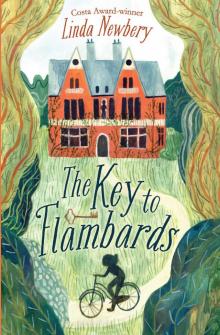 The Key to Flambards
The Key to Flambards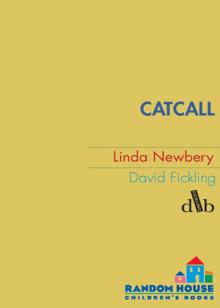 Catcall
Catcall Sisterland
Sisterland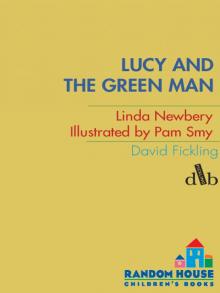 Lucy and the Green Man
Lucy and the Green Man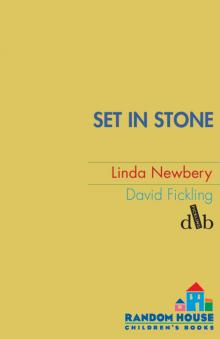 Set In Stone
Set In Stone Lob
Lob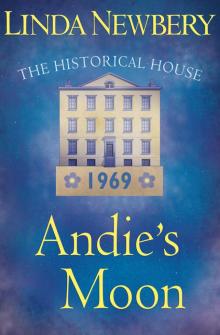 Andie's Moon
Andie's Moon The Shell House
The Shell House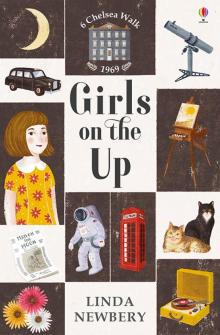 Girls on the Up
Girls on the Up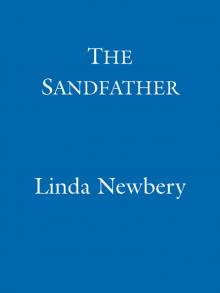 The Sandfather
The Sandfather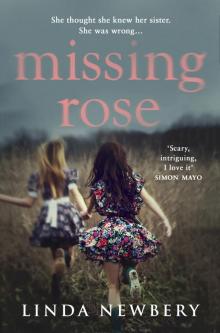 Missing Rose
Missing Rose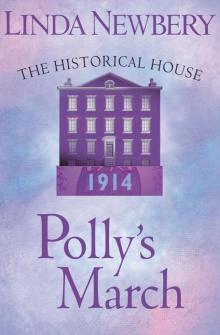 Polly's March
Polly's March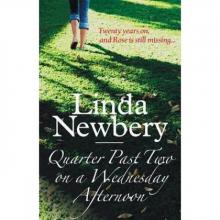 Quarter Past Two on a Wednesday Afternoon
Quarter Past Two on a Wednesday Afternoon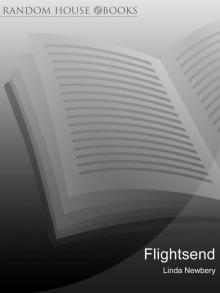 Flightsend
Flightsend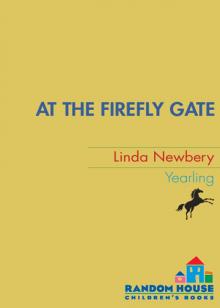 At the Firefly Gate
At the Firefly Gate